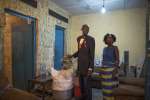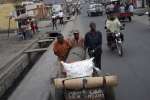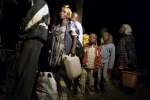- Text size
 |
|  |
|  |
| 
- Français
UNHCR's Angola repatriation operation draws to a close with last flight
News Stories, 20 December 2005

LUANDA, December 20 (UNHCR) – The return of a group of Angolan refugees from Botswana on Monday 19 December marked the end of UNHCR's three-year programme of organised convoys to Angola, under a voluntary repatriation scheme that has helped hundreds of thousands of refugees return home.
The 42 Angolans, who had been living in the refugee camp of Dukwi in north-eastern Botswana, arrived by plane in Menonge in southern Angola where they were given a cash grant to travel on to their home villages along with other assistance to get restarted in life, including cooking equipment, seeds, agricultural and house-building tools. Each person also received a two-month food ration from our sister agency, the World Food Programme.
The signing of a peace agreement in April 2002 after 27 years of war gave Angolan refugees the chance they had been waiting for. Tens of thousands decided to return immediately on their own initiative, despite the difficulties facing them in the war-destroyed country.
Since the UN refugee agency's repatriation assistance began in 2002, UNHCR in Angola has assisted 89,000 refugees who arrived home on their own. In addition, 150,000 Angolans repatriated without asking for any assistance. In 2003, UNHCR began directly organising the voluntary return of refugees from other countries, bringing more than 123,000 Angolan refugees home by the time the programme ended this month.
"Angola has witnessed the return of about half a million of its citizens, who can join their fellow countrymen as the nation moves ahead in its post-war development," said Annette Rita Nyekan, deputy representative of UNHCR in Angola. "This operation has been of great benefit to the country, the countries of asylum and UNHCR."
This year more than 28,000 Angolans returned with the assistance of UNHCR from neighbouring countries – mainly Zambia and the Democratic Republic of the Congo (DRC) – 15,000 by charter air flights and the rest in land convoys. In addition, nearly 9,000 refugees received UNHCR assistance inside the country after returning on their own and approaching UNHCR reception centres; a further 15,000 came home without any help.
While aircraft chartered by the International Organization for Migration have carried small numbers of refugees back this year from countries such as Botswana, Namibia, and the Republic of Congo, their main air operation has been from Zambia – sometimes a couple of aircraft flying daily.
Most returnees over the three years have come by road, often over routes that first had to be made safe after decades of damage by war and neglect. Before UNHCR began running returnee convoys in 2003, destroyed bridges had to be rebuilt and roads swept for mines – repeatedly because they rise to the surface, especially during the rainy season that is now obstructing movement inside the country.
At the end of this year there will still be an estimated 96,000 Angolan refugees outside the country, including those in camps in Zambia, DRC and Namibia, urban refugees caring for themselves and those registered as settled in other countries. Most of the remaining Angolan refugees in camps have shown little desire to repatriate and in 2006 a similar level of assistance will continue for them in the countries where they received asylum.
There are also an unknown number of Angolans who have settled outside camps mainly in DRC and Zambia, where UNHCR is currently conducting a registration exercise to establish their intentions for return. Although transport will only be made available for the most vulnerable cases, UNHCR will provide resettlement assistance inside Angola to those who return on their own. The future of Angolan refugees still in Zambia who have not taken up UNHCR's repatriation assistance will be discussed when the Tripartite Commission – grouping Zambia, Angola and UNHCR – meets in January.
The conclusion of the repatriation phase of UNHCR operations means the focus will now swing solidly toward the resettlement programmes, which have already been operating for previous returnees.
Earlier this year the government of Angola, with UNHCR support, launched the Sustainable Reintegration Initiative for areas where refugees were returning – mainly border areas – as part of its national development plans. UNHCR will seek to ensure development agencies include returnee areas in their planning and will also help fund key reintegration projects.
"The peace and reconciliation activities, as well as the forthcoming reintegration activities that will be implemented by UNHCR, its implementing partners, other UN agencies and the international community, will ensure that resettled refugees play a major role in the future of Angola," said Nyekan.
"This will be vital as Angola recovers from three decades of war, and assumes its rightful place, based on its resources and potential, as a major player in the southern African region," said the UNHCR official.
National elections are tentatively scheduled for next year and, despite widespread poverty, the oil-based economy is developing. Unlike earlier ceasefires – and hopes of repatriation – that were quickly shattered, returnees this time have seen the peace continue.
By Jack Redden
















































